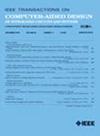A Delay-Driven Iterative Technology Mapping Framework
IF 2.7
3区 计算机科学
Q2 COMPUTER SCIENCE, HARDWARE & ARCHITECTURE
IEEE Transactions on Computer-Aided Design of Integrated Circuits and Systems
Pub Date : 2024-12-31
DOI:10.1109/TCAD.2024.3524463
引用次数: 0
Abstract
Technology mapping is the pivotal synthesis step that translates abstract logical models into technology-dependent implementations using the designated library, e.g., standard cells for ASICs. The efficient solutions heavily rely on the gate selection guided by estimated delay. However, estimating these delays is sophisticated due to the absence of actual interconnect load and transition time during the mapping. In this article, we revisit the difficulties of the delay-driven mapping problem and explore three key insights to address these. Inspired by the insights, we first design a structure-aware load-slew model that integrates input transitions and output loads for gate delay estimations. Benefiting from the model, we propose a delay-iterative framework that progressively reduces the overall circuit delay by further aligning library characteristics with logical network structures. Finally, experiments with 130 nm and 7 nm libraries show its superiority, which averagely reduces circuit delay by 10% with nonlinear delay model, and 6% in delay after P&R, as compared to ABC.延迟驱动迭代技术映射框架
技术映射是关键的综合步骤,它使用指定的库(例如asic的标准单元)将抽象逻辑模型转换为依赖于技术的实现。有效的解决方案很大程度上依赖于由估计延迟引导的栅极选择。然而,由于在映射过程中缺乏实际的互连负载和转换时间,估计这些延迟是复杂的。在本文中,我们将重新审视延迟驱动映射问题的困难,并探讨解决这些问题的三个关键见解。受这些见解的启发,我们首先设计了一个结构感知的负载转换模型,该模型集成了用于门延迟估计的输入转换和输出负载。得益于该模型,我们提出了一个延迟迭代框架,通过进一步将库特性与逻辑网络结构对齐,逐步降低整体电路延迟。最后,在130 nm和7 nm库上的实验表明,与ABC相比,在非线性延迟模型下平均减少了10%的电路延迟,在P&R后平均减少了6%的延迟。
本文章由计算机程序翻译,如有差异,请以英文原文为准。
求助全文
约1分钟内获得全文
求助全文
来源期刊
CiteScore
5.60
自引率
13.80%
发文量
500
审稿时长
7 months
期刊介绍:
The purpose of this Transactions is to publish papers of interest to individuals in the area of computer-aided design of integrated circuits and systems composed of analog, digital, mixed-signal, optical, or microwave components. The aids include methods, models, algorithms, and man-machine interfaces for system-level, physical and logical design including: planning, synthesis, partitioning, modeling, simulation, layout, verification, testing, hardware-software co-design and documentation of integrated circuit and system designs of all complexities. Design tools and techniques for evaluating and designing integrated circuits and systems for metrics such as performance, power, reliability, testability, and security are a focus.

 求助内容:
求助内容: 应助结果提醒方式:
应助结果提醒方式:


